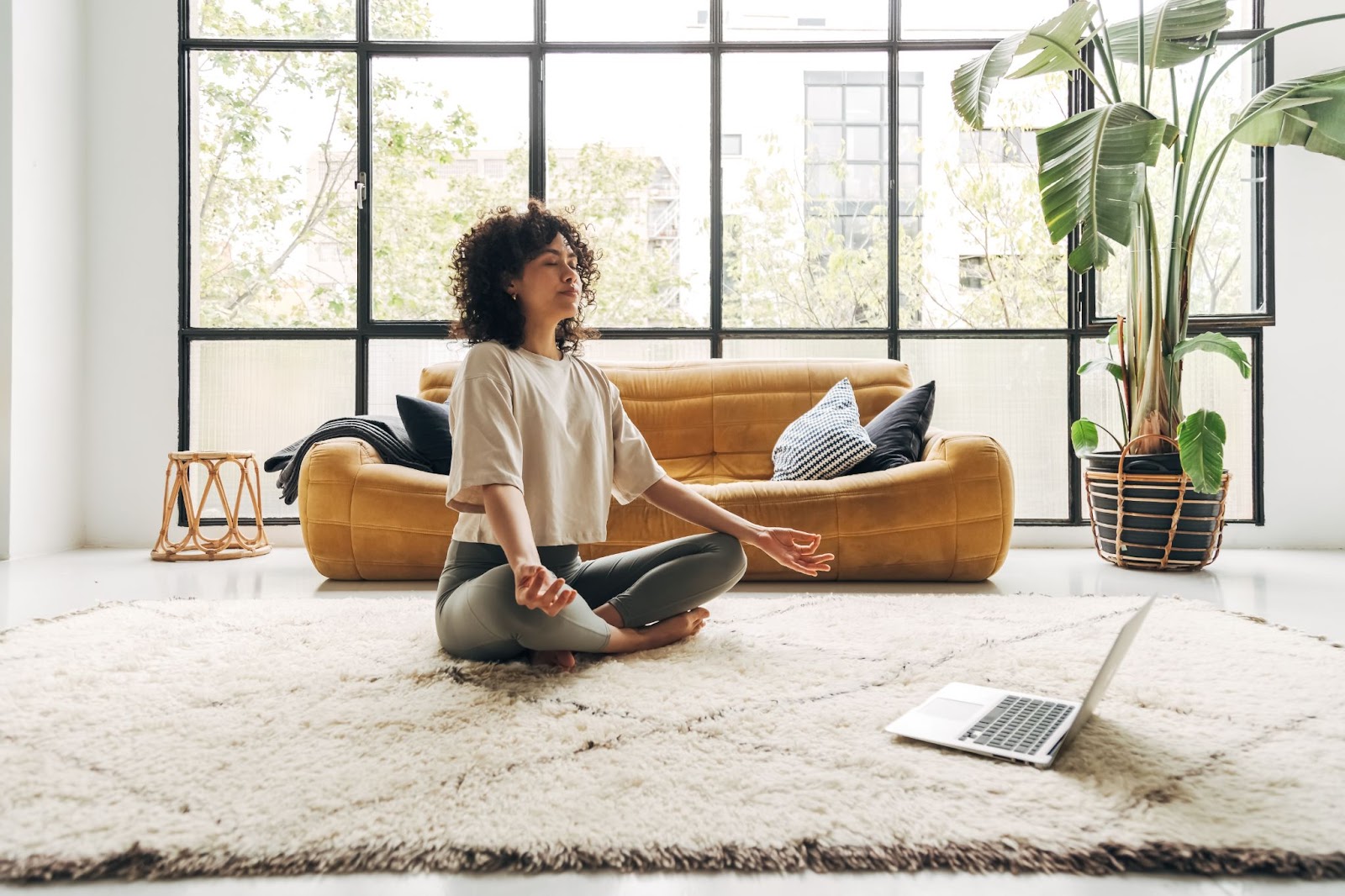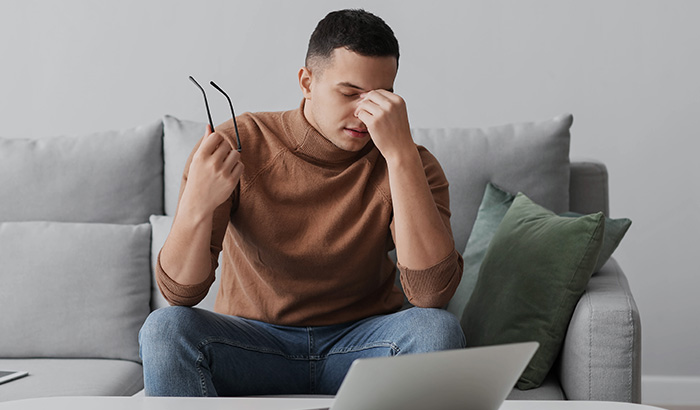So, you’re looking to tackle your anxiety head-on, right? It’s something a lot of folks deal with, and I’m really glad you’re reaching out to explore your options.
Anxiety is like this constant background noise that doesn’t let up, impacting everything from work to your social life. But the good news is, there’s a whole toolbox of strategies we are ready to dive into to help dial down that noise and bring some peace back into your life.
In this guide, we’re going to walk through a variety of treatments — think of it as a menu of options, from therapy and medication to lifestyle tweaks and some of the latest tech tools designed to ease anxiety. It’s all about finding the right fit for you.
So, grab a cup of coffee, and let’s chat about the different ways to manage your anxiety. It’s a journey, but you’re not walking it alone.
Understanding anxiety
You know that feeling when you’re on a roller coaster ride? Anxiety feels a lot like that. It makes your heart race and your stomach do somersaults. Sounds familiar, right? Well, that’s because anxiety affects our bodies. When we’re anxious, our body releases special chemicals, such as adrenaline, which make us feel on edge, fidgety, and sometimes even a little queasy.
Anxiety is sneaky, my friend. It might show up when we’re worried about something, like a test or a big game. But it might also appear out of the blue for no apparent reason. This is called generalized anxiety disorder (GAD). It’s like having a pesky little voice in your head that keeps circling around all sorts of worries and making it hard for you to relax.
Now, don’t fret! There are many ways we can help with anxiety. We have some terrific tools and strategies to regain control and show anxiety who’s boss.

Option 1: psychotherapy
Psychotherapy is like having a friendly chat with a skilled professional who helps you understand and manage your worries, fears, and anxious thoughts. Let’s learn more about this fascinating world together!
Psychotherapy is a type of therapy where you meet with a trained therapist or psychologist who specializes in treating anxiety and other mental health concerns. They are like detectives, working alongside you to unravel the mysteries of your mind and guide you toward a happier, calmer state of being.
In psychotherapy sessions, you get to explore your emotions, thoughts, and behaviors in a safe, non-judgmental space. It’s a bit like talking to a trusted friend who happens to be trained in understanding the complexities of the human mind. They’ll listen attentively, ask thoughtful questions, and help you gain insights into the root causes of your anxiety.
One popular approach to psychotherapy is called cognitive-behavioral therapy (CBT). It focuses on the connection between your thoughts, feelings, and actions.
Imagine you’re in a forest of anxious thoughts, and your therapist helps you find a clear pathway that leads to a peaceful meadow, far away from the stress and worry. They teach you how to identify negative thoughts, challenge them, and replace them with more positive and realistic ones.
Another effective psychotherapy technique is called exposure therapy. It might sound a bit intimidating, but it’s actually quite empowering. Basically, it helps you face your fears in a gradual and controlled manner.
Let’s say you fear public speaking; your therapist might create situations where you gradually expose yourself to speaking in front of others, starting with a small and supportive group. With each step, you’ll realize that your anxiety lessens, and you become more confident in handling those nerve-wracking moments.
Now, here’s the exciting part — psychotherapy isn’t only talking. Therapists also equip you with practical strategies and tools to manage anxiety in your everyday life.
They might teach you relaxation techniques, such as deep breathing exercises or mindfulness, to help calm your racing heart and thoughts. These techniques act like magic spells that bring a sense of tranquility and peace amidst the chaos of anxiety.
Additionally, therapists are wonderful at helping you identify and change unhealthy behaviors that contribute to your anxiety. They might suggest setting achievable goals, breaking tasks into smaller steps, or even creating a daily routine that promotes self-care and stress reduction.
Together, you’ll build a toolkit of healthy coping mechanisms that banish anxiety monsters from your life.
You can attend psychotherapy sessions one-on-one with you and your therapist or participate in group therapy where you meet and connect with others who share similar struggles. Group therapy is particularly beneficial, as it allows you to learn from others, gain different perspectives, and realize that you are not alone in this journey.
It’s important to remember that psychotherapy is not a quick fix or a magic potion. It takes time and effort, like tending to a garden. But with each session, you’re nurturing your mind and gently coaxing your anxious thoughts toward a place of healing and tranquility.

Option 2: medication
When we talk about medication for anxiety, it’s important to understand that there are different types of medications available. Doctors often prescribe medication based on the type and severity of anxiety symptoms we experience. These medications help us feel better and manage our anxiety.
One common type of medication for anxiety is called Selective Serotonin Reuptake Inhibitors, or SSRIs for short. SSRIs are a kind of antidepressant that works by increasing the level of a chemical called serotonin in our brain.
You see, serotonin is like a messenger that helps to regulate our mood. By boosting the amount of serotonin, SSRIs help us feel less anxious and more balanced in our emotions. How cool is that?
Another type of medication that might be prescribed for anxiety is Benzodiazepines. These medications work by calming down our nervous system. Think of it as hitting the pause button on all those racing thoughts and worries that make us feel anxious.
Benzodiazepines help us relax and sleep better if anxiety is keeping us up at night. However, it’s important to use them only as directed by your doctor because they can be habit-forming if misused.
Now, let’s talk about some pros and cons of medication for anxiety. One big advantage is that medication provides quick relief for those moments when anxiety is interfering with our daily lives. It’s like having a life jacket to keep us afloat during a stormy sea of worry.
Medication helps us regain our focus, feel more at ease, and engage in activities we enjoy without that constant feeling of anxiety hanging over us.
However, like with any other treatment option, medication also has some downsides. Some people may experience side effects when taking medication for anxiety. These range from mild, like feeling a bit drowsy or having a headache, to more severe, like nausea or changes in appetite.
Remember, everyone’s body is unique, so what might affect one person may not affect another in the same way. It’s essential to tell your doctor about any side effects you experience so they are able to adjust your medication if needed.

Option 3: lifestyle modifications
Sometimes, we overlook the power of small changes in our daily routines to make a big difference in our mental health. So, let’s dive in and discover some lifestyle modifications that help ease anxiety.
1. Regular exercise
Believe it or not, exercise does wonders for combating anxiety. When we engage in physical activity, our body releases endorphins, often called “feel-good” chemicals. These endorphins help boost our mood and reduce feelings of stress and anxiety.
Even something as simple as going for a walk outside can make a significant impact on your overall well-being.
2. Healthy eating habits
Did you know that what we eat impacts our anxiety levels? Choosing a well-balanced diet that includes plenty of fruits, vegetables, whole grains, lean proteins, and healthy fats is essential.
Certain nutrients, like omega-3 fatty acids found in fish or flaxseed, help reduce anxiety symptoms. You may want to consider limiting or avoiding caffeine, sugary foods, and alcohol, as they exacerbate anxiety. Taking care of your body through proper nutrition has a positive effect on your mind, too!
3. Quality sleep
Getting enough sleep is crucial for maintaining good mental health. When we don’t get sufficient rest, our anxiety levels often skyrocket. Establishing a regular sleep routine and aiming for 8-10 hours of sleep each night is beneficial.
Avoiding screens before bed, practicing relaxation techniques, and creating a comfortable sleep environment will help you achieve a good night’s rest and reduce anxiety.
4. Stress management
Learning how to manage stress is essential for everyone, especially those experiencing anxiety. Try relaxation techniques such as deep breathing exercises, meditation, or yoga to find what works best for you to calm your mind and body when stress arises.
Take this one step further and experiment with hobbies or activities you enjoy, such as engaging in arts and crafts, playing an instrument, or spending time in nature. Finding healthy outlets to release stress significantly contributes to anxiety reduction.
5. Social support
Having a strong support system is vital when dealing with anxiety. Reach out to your friends, family, or a support group. Talking about your feelings with trusted loved ones will provide comfort and help ease anxiety symptoms. Sometimes, knowing that someone is there to listen and support you makes a world of difference.
Incorporating these lifestyle modifications into your everyday routine is an effective way to manage anxiety. While it may take time to notice significant changes, remember that even small improvements make a big impact on your overall well-being. Be patient and kind to yourself, and don’t hesitate to seek professional guidance whenever needed.

Option 4: mindfulness and relaxation techniques
Mindfulness is all about being present in the moment, fully aware of your thoughts, feelings, and surroundings without judgment. When thoughts of anxiety start taking over, practicing mindfulness will help redirect your focus. This allows you to ground yourself in the present rather than getting lost in worries about the future or regrets about the past.
One useful mindfulness technique is deep breathing. Simply taking slow, deep breaths and paying attention to the sensation helps calm your nervous system and reduce anxiety. Try inhaling deeply for a count of four, holding your breath for three counts, and then exhaling slowly for a count of five. Repeat this for a few minutes, and you might notice a significant difference in how you feel.
In addition to these techniques, there are various apps and online resources available that offer guided mindfulness meditations. These guided sessions help you stay focused and provide valuable insights from experienced meditation practitioners, making it even easier to incorporate mindfulness into your daily routine.
Now, let’s dive into relaxation techniques. While mindfulness focuses on calming the mind, relaxation techniques aim to help your body relax physically. One excellent relaxation technique is progressive relaxation, where you consciously tense and then relax different muscle groups in your body. This technique provides a sense of relief by reducing muscle tension caused by anxiety.
Visualization is another relaxation technique that transports your mind to a peaceful place, releasing stress and anxiety. Imagine yourself in your favorite calm and serene spot — it might be a peaceful beach or a quiet forest. Close your eyes and vividly imagine all the sights, sounds, and smells you would encounter there. This mental escape may have a remarkably calming effect on your anxious mind.
What’s great about mindfulness and relaxation techniques is that they are easily accessible; you can practice them almost anywhere. Whether you’re at home, work, or even in a crowded place, use these techniques to find a sense of calm.
Option 7: TMS therapy
Let’s understand what TMS therapy is all about. TMS therapy involves using magnets to create tiny, gentle pulses of energy that target specific areas of your brain responsible for managing your mood. These pulses help to stimulate those areas, like a little boost of sunshine for your brain!
Now, you might be wondering how TMS therapy actually works. Well, during a TMS session, you’ll sit comfortably in a chair while a special device gently rests on your head.
This device sends those magnetic pulses we talked about to the targeted area of your brain. It’s completely painless, and you can even listen to your favorite music or read a book during the session!
So, how does TMS therapy help with anxiety? Well, our brains have a bunch of different chemicals called neurotransmitters, which are like happy little messengers that help send signals between our brain cells.
Sometimes, when we’re feeling anxious, these messengers get a little out of balance. TMS therapy swoops in like a superhero to restore that balance and help those messengers do their job properly.
Many people who have tried TMS therapy report feeling a significant reduction in their anxiety symptoms. It’s like watching those storm clouds slowly drift away, leaving a clear and sunny sky in their wake!
But as with any superhero power, TMS therapy does have its limitations. It might not be the first choice for everyone, especially if you have certain medical conditions or if you’re pregnant. That’s why it’s important to have a chat with your doctor to see if TMS therapy is the right fit for you.
Now, let’s talk about what to expect during a TMS therapy journey. Just like growing a beautiful garden takes time and patience, TMS therapy is not an overnight fix. It usually involves several sessions over a few weeks, so it’s important to stick with the treatment plan prescribed by your doctor. Think of it as watering those seeds of relaxation in your brain until they grow into strong, resilient plants!
TMS therapy at Brain Health Center
Feeling ready to turn the page on anxiety and explore effective treatment options? At Brain Health Center, we’re here to guide you through the journey with cutting-edge TMS therapy tailored specifically to your needs.
Our dedicated team is committed to providing compassionate, personalized care, ensuring you receive the support and solutions that resonate with you. Don’t let anxiety hold you back any longer.
Reach out to Brain Health Center today, and take the first step towards reclaiming your peace of mind and vitality. We’re here for all your TMS therapy needs, ready to help you navigate the path to wellness. Let’s embark on this journey together.

